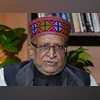Arguably the tallest leader the BJP has produced in Bihar, Sushil Kumar Modi shall be remembered for patiently working towards the party's ascendance in a state where it is on its way to become a dominant force.
Born in a Vaishya family in Bihar, Modi got involved in student politics while pursuing his BSc at Patna University and had played a key role in the Bihar movement of 1974 led by legendary socialist leader Jayaprakash Narayan, during which he also came in touch with his future collaborator Nitish Kumar and would be adversary Lalu Prasad.
He went on to become one of the most prominent leaders of the ABVP, the RSS's students' wing, in Bihar, and often credited his entry into politics to the late Atal Bihari Vajpayee.
According to an anecdote Modi often shared, it was at his marriage ceremony in 1986 that the former prime minister, who at that time headed the BJP, told him that it was time to give up student politics and become a "full time political activist".
He made his electoral debut in 1990 from the now abolished Patna Central assembly seat and old residents of the city recall him as an unassuming figure who moved on a scooter, yet possessed a steely resolve as evident by his tireless activism against alleged corruption in the government headed by Lalu Prasad.
Modi often took pride in having been one of the litigants in the petition on which the Patna High Court ordered that the infamous fodder scam be investigated by the CBI, which later submitted a charge-sheet forcing Prasad to step down in 1997, but only to replace himself with wife Rabri Devi.
Modi earned his spurs as a doughty leader of the opposition in the assembly, a post he held till 2004 when he got elected to the Lok Sabha from Bhagalpur. A year later, however, the RJD-Congress combine was routed in the state assembly polls and Modi was back in Bihar, as the deputy to JD (U) de facto leader Nitish Kumar, who became the chief minister.
More From This Section
It was during this crucial juncture that the party also entrusted him with the state president's post and Modi handled the twin responsibilities with a dexterity that won him many admirers.
Modi occupied the deputy CM's post until Kumar's first break up with BJP in 2013, and was back four years later when the JD (U) supremo realigned with the NDA.
The rapport between Nitish Kumar and Sushil Modi has been the stuff of legend in Bihar politics. The JD (U) leader has often expressed regret over the sidelining of his trusted former deputy, who was stripped of the post after the 2020 assembly polls and shifted to Delhi with a Rajya Sabha berth.
Hardliners in the BJP blamed his "soft" stance towards Kumar for the BJP's inability to gain the upper hand "despite diminution in the chief minister's popularity".
However, few doubt his role in scripting the state's economic turnaround, having held the crucial finance portfolio for more than a decade.
(Only the headline and picture of this report may have been reworked by the Business Standard staff; the rest of the content is auto-generated from a syndicated feed.)

)
